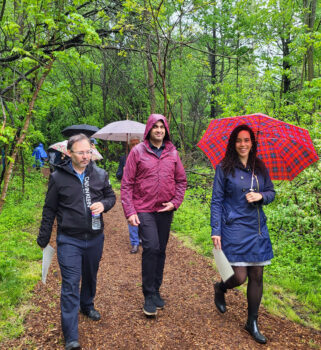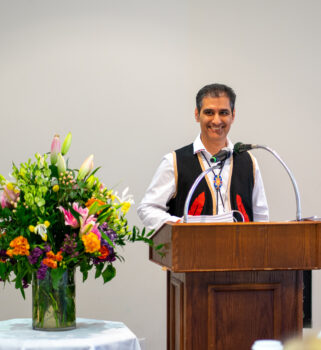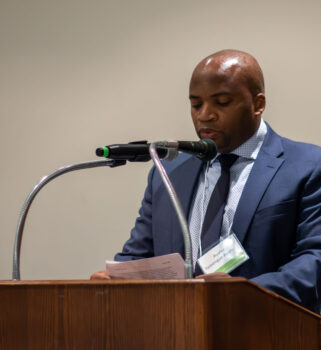The 73rd Bahá’í National Convention
Delegates at the National Convention completed their twin duties of electing the National Spiritual Assembly and consulting on the vision before Canada.
The 73rd Bahá’í National Convention, which took place from 19-22 May 2023 at the Toronto Bahá’í Centre, opened in a state of jubilation over the Universal House of Justice’s announcement that the time has come for a National House of Worship to be raised up in Canada, “in the vicinity of the long-established National Ḥaẓíratu’l-Quds in Toronto.”[1] It was only last year that the delegates of the National Convention had consulted about the conditions that would permit such a development–a longing that has now been abundantly fulfilled. Those present included delegates from coast to coast to coast—from St. John’s, Nfld, to Comox, B.C., to Iqaluit, Nunavut–the National Spiritual Assembly, members of the Continental Board of Counsellors Mr. Ayafor Ayafor and Dr. Borna Noureddin, special guests Dr. Firaydoun and Mrs. Vida Javaheri, as well as a number of Auxiliary Board members, volunteers and observers.
This year’s National Convention was further galvanized by the fact that all nine members of the outgoing National Spiritual Assembly had just returned, invigorated and inspired, from the International Convention in the Holy Land, which took place during the festival of Ridván. They expressed their joy at receiving news of the National Temple in the company of the lovers of Bahá’u’lláh from every corner of the globe, and described the consultations at the international level as demonstrating the reality of a single, unified, worldwide conversation on how to release the society-building power of the Faith.

As a gentle rain descended on them, delegates stepped into the forested area that is now Canada’s Temple Site and prayed under a canopy of trees.
Early Saturday morning the delegates visited the nearby Bahá’í National Centre in rotating groups and, as a gentle rain descended on them, stepped into the forested area that is now Canada’s Temple Site and prayed under a canopy of trees. During this visit the delegates also had the opportunity to visit the council chamber of the National Spiritual Assembly and peruse a number of relics and objects of spiritual significance to the Faith. One delegate from British Columbia shared that after this visit she had never felt more prepared, more ready to elect the National Spiritual Assembly, despite having served as a delegate for a number of years.
On their return to the Toronto Bahá’í Centre, the Board of Trustees of Ḥuqúqu’lláh in Canada presented a beautiful letter to the assembled delegates, which spoke to the profound effects of applying this Law to our daily lives: “Considering our wants and needs changes our interactions with society; we begin to consider others’ needs before our pleasures, we make moderate choices, we control our lower nature by calling on our spiritual nature ahead of our material needs.”[2]
The delegates consulted on this year’s Ridván message, highlighting several lines, including that “increasing attention needs to be given to other processes that seek to enhance the life of a community—for example, by improving public health, protecting the environment, or drawing more effectively on the power of the arts.” The delegates expressed interest in hearing about experience in the realm of social action and public discourse, a thread that continued throughout the consultation.
A delegate from Newfoundland described how his community was learning how to make the arts essential to the activities they do, which led to the engagement of more people. He asked, “Can we use the Temple as a primary example of the beauty that needs to be at the centre of everything?” Others talked about how the arts can help a community to envision the possibilities of the Nine Year Plan. Delegates also sang together at the end of several of the sessions, which was very much in keeping with the spirit of the Mashriqu’l-Adhkár.
The consultation then focused on the movement of clusters along a continuum of development, as well as the educational endeavors and the training institute. There was a sense of shared celebration in the progress of clusters across the country: delegates’ announcements that the cluster they reside in had recently reached the next milestone or a certain number of core activities were repeatedly met with applause. In fact, five clusters in Canada reached the third milestone in the week leading up to the Convention.
A delegate from Ontario shared that some clusters in his region had reached the third milestone with a population of around 30-40 Bahá’ís, demonstrating that new paths to progress have emerged and third milestone clusters are not only those with large Bahá’í populations. The Counsellors also encouraged those present to think beyond the third milestone–to see it not as an endpoint, but as an intensification of the process of social transformation already underway.

Member of the Continental Board of Counsellors Dr. Borna Noureddin addresses delegates at the 73rd National Convention. Photo: Nur Elmasri.
Many of the comments illustrated how mothers and youth are at the forefront of social transformation in their communities. In his comments, Dr. Noureddin referenced these two populations, saying “Through their efforts, entire families are bringing about practical efforts to transform themselves. The institute is an instrument wielded by them.” Indeed, many delegates shared stories of youth and entire families enrolling in the Faith as a natural next step in this process.
Regarding the institute process, Dr. Noureddin shared, “I think we have so much experience with the framework in Canada—this is a strength—that the body of believers in Canada have learned to wield the institute and framework for action. A next frontier for us is to ensure this is in the hands of as many of the 37 million Canadians as possible. What are some of the small and profound shifts that unlock the power of populations?”
On Saturday evening the delegates had the opportunity to view the film “An Expansive Prospect” commissioned by the Universal House of Justice, which through four case studies from around the world–Malaysia, Brazil, the United States and Kenya–captures the efforts of individuals, communities, and institutions as they strive to release the society-building power of the Faith in ever-greater measures. One delegate from Ontario commented, “Watching the film helps us reflect on two major concepts: transformation and prevalence.”[3] She continued, “How do we communicate this vision in a way that many can move forward?”
The election of the National Spiritual Assembly took place on Sunday morning in a rarified atmosphere of prayer and humility. There was 100% participation in the election from a total of 171 delegates; 157 cast their ballot in person, nine were hand-delivered, and five through e-voting. The members of the National Spiritual Assembly elected for the coming year are: Mehran Anvari, Alex Arjomand, Jordan Bighorn, Zelalem Bimrew Kasse, Hoda Farahmandpour, Gerald Filson, Judy Filson, Ciprian Jauca and Karen McKye. Outgoing members Deloria Bighorn and Elizabeth Wright were thanked for each serving 14 years on the National Spiritual Assembly. Earlier this year, the National Assembly had accepted their request to relinquish membership on that institution at the time of the Convention.
The members of the National Spiritual Assembly elected for the coming year (left to right): Alex Arjomand, Mehran Anvari, Gerald Filson, Karen McKye, Hoda Farahmandpour, Judy Filson, Zelalem Bimrew Kasse, Ciprian Jauca, and Jordan Bighorn. Photo: Liam Dousti.
Indigenous teaching was another thread throughout the consultations, with delegates recognizing that strides had been made over the last year to share learning across the country, building on existing strengths. This was particularly observed in the National Spiritual Assembly’s annual report, where case studies from localities across the country, each engaging Indigenous populations in the institute process, were shared. In all cases, prayer, the use of the arts, and relating Bahá’í teachings to Indigenous spirituality were important elements in institute activities.
The Convention also had the opportunity to consult on the material means that will be necessary for growth. The National Assembly set out the goal for the Canadian community to raise the funds required for the Temple and raised its budget by $5M as an initial step. The needs of the Deputization Fund were also emphasized, which supports pioneers and institute tutors like youth year of service. Dr. Noureddin shared, “This word ‘deputization’ represents a Law of Bahá’u’lláh. It’s not just a practical way to contribute to the teaching work. When we think of his command to teach every day…in this country it is sometimes difficult, particularly in the way employment is arranged, to find ways to teach daily. Contributing to the Deputization Fund fulfills your obligation to teach the Faith.”
The delegates also discussed how to nurture stirrings of social action at the grassroots, and several friends provided examples of efforts underway. These included study clubs and homework help initiatives, projects to help youth and their parents exercise agency in their use of social media, organizations for English Language learning, and initiatives addressing the mental health of young people.
Several delegates also highlighted the resources available to help us understand fundamental concepts in relation to the areas of social action and public discourse: the seminars organized by the Institute for Studies in Global Prosperity, offered to Bahá’í students during their university years, as well as the first units of Ruhi Book 13: Engaging in Social Action and Ruhi Book 14: Participating in Public Discourse.

Member of the Continental Board of Counsellors Mr. Ayafor Ayafor addresses delegates at the 73rd National Convention. Photo: Gregory Vochin.
Of course, prayer was also a significant component of the Convention, with special prayers offered for the 10 Bahá’í women martyred 40 years ago in Shiraz, all those Canadian Bahá’ís who had departed from the world this year, as well as a special devotional prepared by the Board of Trustees of Ḥuqúqu’lláh in Canada.
In his closing remarks, Mr. Ayafor also referenced prayer: “We have been given the bounty of erecting a National House of Worship…What would it look like in neighbourhoods across the country, maybe even a couple of streets in a neighbourhood, where everyone is praying together and serving together, exemplifying the spirit of the Mashriqu’l-Adhkár? What would it take to accomplish this? Can we set our sights on this? When we launch this House of Worship representatives from these neighbourhoods can attend and bring this spirit to the temple.”
[1] From the Universal House of Justice to the Bahá’ís of the World, Ridván 2023.
[2] From the Board of Trustees of Ḥuqúqu’lláh to the 2023 National Convention.
[3] Prevalence refers to when a pattern of community life inspired by the Bahá’í Teachings has reached many in a single geographic area.
Category: Features, National Spiritual Assembly








